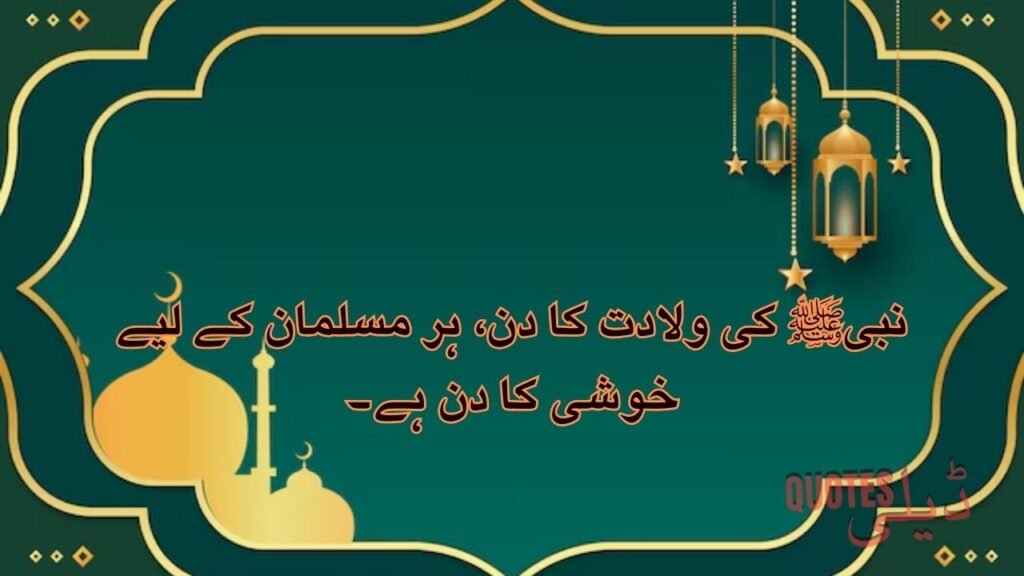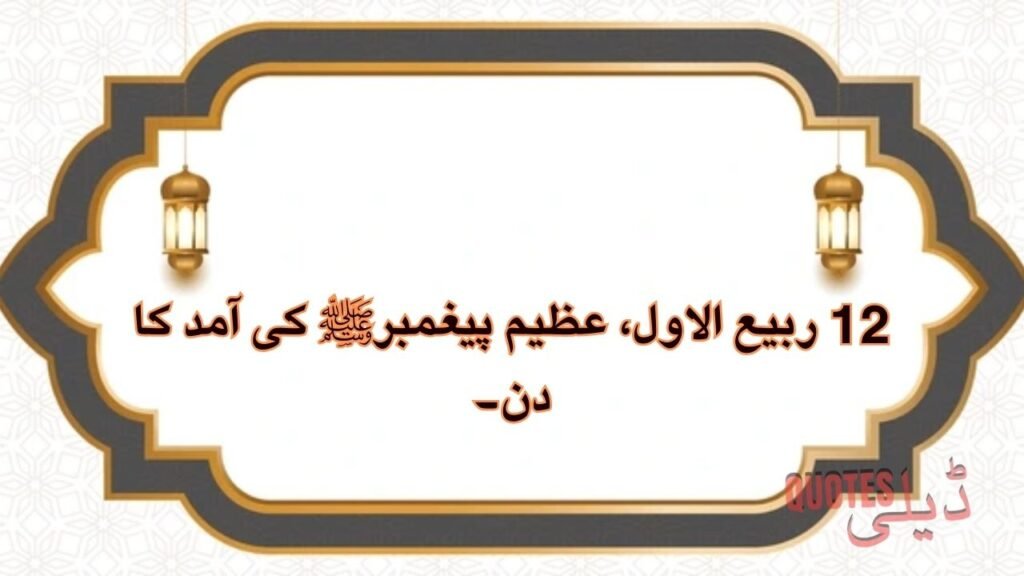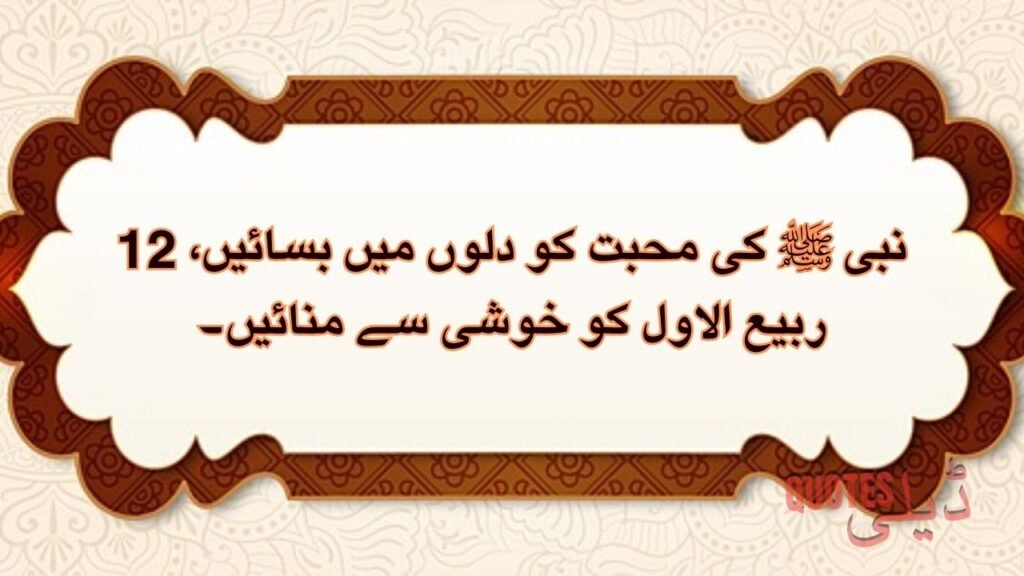12 Rabi’ al-Awal is a significant date in the Islamic calendar as it marks the birthday of the Prophet Muhammad (PBUH), the founder of Islam. This day is also known as Mawlid al-Nabi or Mawlid in many parts of the Muslim world. Here’s an overview of its significance and how it’s observed:
12 Rabi al-Awal:
Birth of the Prophet Muhammad (PBUH): The 12th of Rabi’ al-Awal in the year 570 CE ko Nabi Muhammad (PBUH) ki paidaish ka din maana jata hai, jo Mecca, Saudi Arabia mein hui thi. Unki paidaish Islami tareekh ke sabse aham waqiat mein se ek hai kyun ke unhon ne duniya mein Islam ka paigham pohnchaya.
Spiritual Importance: Yeh din Nabi (PBUH) ki taleemat, unki zindagi, unke kirdar, aur insaniyat ke liye unke contribution par ghour-o-fikr ka waqt hota hai. Musalman unhein ek role model ke taur par dekhte hain aur unki taleemat jaise ke rehamdili, tawazun, aur insaf ki pairwi karne ki koshish karte hain.
Read More:

یومِ ولادتِ رسولﷺ، محبت اور امن کا پیغام ہے۔

ربیع الاول کے دن دنیا میں رحمت کے دروازے کھل گئے۔

ربیع الاول کی آمد سے دلوں میں محبت رسولﷺ کی شمع روشن ہوتی ہے۔

یومِ ولادتِ مصطفیٰ ﷺ، ایمان کو تازگی بخشتا ہے۔

ربیع الاول کا مہینہ نبی پاک ﷺ کی آمد کی خوشخبری لے کر آتا ہے۔

خوشی کا دن ہے، محمد ﷺ کی آمد کا دن ہے۔

ربیع الاول کے دن دنیا میں ہدایت کا نور پھیلا۔

12 ربیع الاول، دن ہے خوشیوں کا، دن ہے رحمتوں کا۔

نبیﷺ کی ولادت کا دن، ہر مسلمان کے لیے خوشی کا دن ہے۔

ربیع الاول کا مہینہ، اللہ کی عظیم نعمتوں میں سے ایک ہے۔

محمد ﷺ کی آمد نے دنیا کو امن و سلامتی کا پیغام دیا۔

ربیع الاول کے دن محبت رسولﷺ کی یاد کو تازہ کریں۔

12 ربیع الاول، عظیم پیغمبرﷺ کی آمد کا دن۔

نبی ﷺ کی محبت کو دلوں میں بسائیں، 12 ربیع الاول کو خوشی سے منائیں۔

ربیع الاول کی رات، برکتوں کی رات۔

خدا کے محبوب ﷺ کی ولادت کا دن، ہماری زندگیوں کے لیے روشنی کی کرن ہے۔

12 ربیع الاول، دلوں کو نرم کرنے کا دن ہے۔

ربیع الاول کے مہینے میں درود و سلام کی بارش کریں۔

ربیع الاول میں ہم نے پایا خدا کا محبوب ﷺ۔

یوم ولادتِ رسول ﷺ پر محبت اور امن کا پیغام عام کریں۔
Observance of Mawlid al-Nabi:
The observance of 12 Rabi’ al-Awal varies greatly among different Muslim communities around the world. Here are some common ways it is celebrated:
- Prayers and Recitation: Many Muslims engage in extra prayers (Nafl), recite the Qur’an, and chant praises (Naats) and poems (Qasidas) in honor of the Prophet (PBUH). Recitations of the Prophet’s biography, or Seerah, are also common.
- Lectures and Sermons: Islamic scholars often deliver lectures or sermons that focus on the life, teachings, and character of the Prophet Muhammad (PBUH). These talks are intended to educate and inspire Muslims to live their lives in accordance with his example.
- Charity and Acts of Kindness: Many Muslims mark the day by engaging in charitable acts, such as feeding the poor, donating to charity, or engaging in community service. This reflects the Prophet’s emphasis on helping those in need and showing kindness to all.
- Processions and Celebrations: In some countries, processions, parades, and gatherings are organized where people come together to celebrate and express their love for the Prophet (PBUH). Houses, mosques, and streets are often decorated with lights and banners.
- Fasting: Some Muslims choose to fast on this day as a way of expressing gratitude and devotion to Allah and commemorating the birth of the Prophet (PBUH).
Variations in Observance:
While 12 Rabi’ al-Awal is widely celebrated among many Muslims, some Islamic scholars and sects debate the religious basis for these celebrations. For instance, some argue that there is no historical precedence in early Islamic traditions for celebrating the Prophet’s birthday, and thus it should not be an established practice. Others see it as a cultural expression of love for the Prophet and a means to remind the faithful of his teachings.
Conclusion:
12 Rabi’ al-Awal, or Mawlid al-Nabi, holds great importance for Muslims worldwide as they reflect on the life and teachings of the Prophet Muhammad (PBUH). Whether through prayer, charity, or communal celebrations, it is a day that brings the Muslim community together in remembrance and spiritual reflection.






